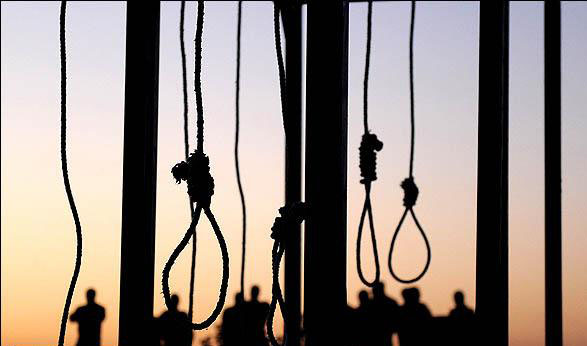12 Executions inside Orumiyeh Central Prison in 11 Days; 9 of These for Drug Offenses
Twelve prisoners were hanged inside the Orumiyeh Central Prison between October 18 and October 29, nine of these for drug trafficking crimes, the International Campaign for Human Rights in Iran has learned.
According to a source, on October 18, 2014, five inmates sentenced to death on drug-related charges were transferred from the facility’s Ward 15 to its Quarantine Ward, and hanged at 11:30 p.m. The five inmates, all citizens of Orumiyeh, were Fakhreddin Ghavidel, Esfandiar Ghahremani, Nejat Karimi, Arash Sigari, and Bahram Seddighi.
Five other inmates, Salaheddin Behnam Kerdar, Rashid Alizadeh, Reza Tahmassebi, Younes Golbahar, and Latif Mohammadi, were executed in the same facility on October 26, 2014. All of them, except for Mohammadi, had been sentenced to death on charges of drug trafficking and possession.
According to the United Nations, death sentences may be assigned only in the case of the “most serious” crimes, and drug-related charges do not fulfill this requirement. The vast majority of executions in Iran are carried out for drug-related offenses.
Recently, Iran’s top human rights official, Mohammad Javad Larijani, stated in a CNN interview [Link: http://www.cnn.com/video/api/embed.html#/video/world/2014/10/29/intv-amanpour-michael-holmes-iran-jason-rezaian-mohammad-javad-larijani-journalists.cnn] that 80% of the executions in Iran are drug-related and that the “world should appreciate” Iran’s war on narcotics. The UN’s Special Rapporteur on human rights in Iran, however, stated in his most recent report that “The rise in executions for crimes that do not meet the threshold of ‘most serious crimes’…severely contravene[s] the [Iranian] Government’s international and national commitments.”
Iran has the highest per capita execution rate in the world. According to the UN’s Special Rapporteur on Iran, between July 2013 and June 2014, at least 852 individuals were executed.
Another one of the executed individuals, Latif Mohammadi, was charged with murder and armed robbery. However, the victim’s family subsequently forgave Mohammadi, and, under Iranian law, his Qisas (retaliatory death sentence) should have been either commuted or forgiven completely. Nevertheless, he remained on death row on the armed robbery charges and was executed along with the individuals convicted of drug crimes.
According to the source, on October 29, 2014, two other inmates, Ebrahim Choopani, a resident of Mahabad in Kurdistan Province arrested in 2009, and Yousef Hajiloo, a resident of Maku in West Azerbaijan Province arrested in 2008, were also hanged inside the Orumiyeh Prison for Qisas on charges of murder.
The Campaign and United Nations experts have called for an immediate moratorium on executions in Iran as Iran’s judicial process is characterized by an endemic lack of due process. Defendants are routinely denied access to counsel, forced under threat or torture to “confess,” and then convicted, including in capital cases, after brief, unfair trials.
Additionally, news of these twelve executions has not been announced by any official Iranian news media, continuing a long-standing pattern of a lack of transparency regarding executions in Iran.







